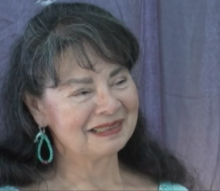
Born: East Los Angeles, California
Gloria Arellanes was born in East Los Angeles in 1946, but for the majority of her life, she has resided in El Monte, California, living in the same home for over fifty years. Her father was a first generation Mexican-American whose family migrated to the United States from Chihuahua, Mexico, and her mother was a Tongva Native American. In the 1950s and 1960s, El Monte experienced extreme racial tension, and Arellanes witnessed race riots throughout her high school years. She attended college briefly before choosing to drop out, pursuing travel and more life experience. At this young age, she began interacting with a group that would later proclaim themselves the Brown Berets.
At first she was unsure about joining the radical group, but Arellanes became deeply involved and eventually became the only woman to hold a major leadership position within the organization. As the Minister of Finance and Correspondence for the founding chapter, Arellanes wrote press releases, penned letters, and edited the group’s newspaper, La Causa. Like the Black Panthers, the Brown Berets were considered an extreme, paramilitary group by law enforcement, but their objectives revolved around community betterment and social change. They worked to achieve better education for Chicano youth, gain adequate health services in their communities, end police brutality against minorities, and promote cultural pride. The Brown Berets created El Barrio Free Clinic, and Arellanes was given the task of managing its day-to-day operations. Although she was initially apprehensive about taking the job, El Barrio Free Clinic soon became her passion. Public health facilities and the local hospital knew that she could reach the people they could not. The hospital sent her supplies and picked up lab work from the free clinic regularly. Young people were more comfortable at the clinic, while others were not worried about their legal status affecting their treatment there. Arellanes took pride in the positive impact the clinic had on community members and was thrilled when it sparked interest in the medical field for people who had not considered such careers before.
During her time with the Brown Berets, Arellanes attended many major Chicano movement events, including the Poor People’s Campaign in Washington, DC, the blowouts, or high school walkouts in Los Angeles, and both Denver Youth Conferences. Arellanes even rented a truck to shuttle high school students to the Denver Youth Conference with her. In the early 1970s, after years of mistreatment and sexism, all female members separated from the Brown Berets. After her departure from the Brown Berets, Arellanes organized Las Adelitas de Aztlán, a women’s group, and started another free clinic, La Clinica del Barrio. Her involvement in the Chicano Moratorium, a large anti-Vietnam War and civil rights demonstration, cannot go unnoted either. Arellanes was on stage when the violence broke out. She was tear gassed, and although she recovered physically, she was emotionally scarred for many years by what she witnessed that day.
Since the movement years, Arellanes has reconnected with her Native American heritage and is now an elder of the Tongva tribe. She served as a secretary on the Tribal Council and is part of an Indigenous Grandmothers group. She raised two sons as a single mother and now has a grandson.
